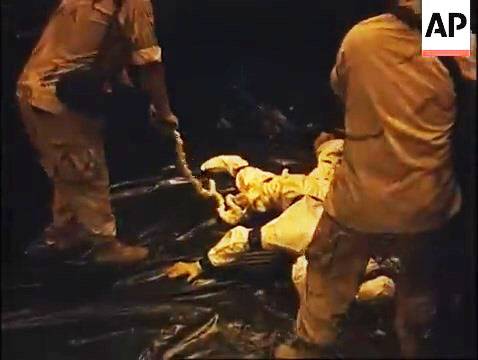Sponge bomb - construction technologies in service with the IDF

The Israeli military studies Palestinian underground structures, 2014. Photo by the Israeli Ministry of Defense
The Israel Defense Forces are conducting a ground operation in the Gaza Strip. If these events develop, Israeli infantry and special forces will have to conduct active operations in urban areas, in dungeons, etc. To counter the enemy in such difficult conditions, the IDF can use various special means. In particular, the foreign press mentions the so-called. “sponge bombs” or “foam bombs” – non-lethal weapon, capable of blocking narrow passages and manholes.
According to the press
The presence of unusual weapons in the Israeli army and the possibility of their use were first reported by the British publication The Telegraph. On October 25, it published the article “'Sponge bombs' are Israel's new secret weapon to block Hamas tunnels.” The material provides general information about the new product in service with the IDF, its features and capabilities.
It is curious that British journalists do not disclose the source of the information they received about the “new secret weapon.” They do not cite official or unofficial sources, and the IDF does not comment on this topic. All this leads to certain doubts, although it does not exclude the possibility that Telegraph is publishing the pure truth.
According to The Telegraph, in the recent past, the Israeli military industry has created a new non-lethal engineering munition of unusual appearance and purpose. At the same time, the development organization and manufacturer remain unknown. The exact dates for the start and completion of work are also not disclosed. However, already in 2021 the product was ready for testing.

Israeli fighters in the tunnel. Photo by Israeli Ministry of Defense
It is reported that about two years ago, a "sponge bomb"/"foam bomb" was tested at the Tze'elim military base test site. For training of the Israeli military, a town was built there, imitating the buildings and conditions of Gaza with all its features and characteristic features, including underground communications. The new engineering ammunition was tested under these conditions.
When triggered, the “bomb” releases chemical reagents that form a large volume of foam-like substance. The latter quickly hardens and blocks the passage. The use of such a product is practically safe, but care must be taken to avoid getting reagents in the eyes.
Apparently, the 2021 tests were considered successful. The “sponge bomb” entered service with the IDF, probably special forces prepared to work in the difficult conditions of urban development and underground communications. Now it can be used as part of a real ground operation. However, nothing is known about such plans of the IDF. Moreover, even the very fact of the existence of an engineering “sponge bomb” is not confirmed.
Assumed principle
It is claimed that the sponge bomb is a compact and lightweight device suitable for carrying by personnel. However, its dimensions and mass are unknown. The body of the product is actually a plastic tank separated by a metal partition. The two sealed compartments of the reservoir contain two liquid chemical components. As one can judge, the “bomb” does not have the pyrotechnic elements characteristic of traditional engineered ammunition.

At the Tzeelim base it is time to rest. Photo: Thedrive.com
When using a “foam bomb,” the fighter must remove the partition or use some mechanism of the product to do this. As a result, the two components come into contact, possibly mix and enter into a chemical reaction. The product of this reaction is a large amount of foam-like substance, which rapidly expands and occupies the available volume. In addition, the foam hardens quickly, forming a kind of spongy plug.
The tactical and technical characteristics of the device are unknown. The dimensions of the “bomb” and the volume of its reservoirs, the quantity and type of reagents, etc. are in question. It is likely that one product can produce tens or hundreds of liters of foam, which is enough to cover a typical Palestinian underground tunnel.
Tactical role
The unusual kind of engineering munition described by The Telegraph has obvious advantages and may be of interest to armies or intelligence agencies. Therefore, it cannot be ruled out that the IDF actually ordered the development of a “sponge bomb” in the past and subsequently adopted it for service. In addition, information about the possible use of such products, although not confirmed, looks quite plausible.
The hypothetical “sponge bomb” is not particularly complex in design. Thanks to this, it can be simple to manufacture and operate. The use of off-the-shelf components from the commercial market can also have a positive impact on cost. In particular, the use of reagents available on the market or compositions based on them that meet customer requirements cannot be excluded.
In this case, the chemical part of the product is of greatest interest. For full use in the military sphere, the reaction must proceed as quickly as possible and produce a large amount of foam. In addition, the reaction products must stick to surrounding objects and harden quickly. How exactly these problems were solved is unknown

Demonstration of the American "foam cannon". AP Photo
A new type of engineering warhead should be used as a means of quickly erecting barriers in the enemy’s path. With enough reagents, it can block a doorway, tunnel, etc., limiting the enemy's movements. It is possible that in some situations the foaming agent can literally catch the enemy, but in this case it will be a matter of rare luck.
Depending on the chemical components used, the foam can have different hardness and strength. However, in all cases it will prove to be a fairly effective barrier. To overcome it you will need a tool and a lot of time - the enemy will have to break through the thickness of the material. It will not be possible to get rid of foam by explosion in all situations. In enclosed spaces, various types of explosions can threaten both the structure and its “inhabitants.”
Foreign experience
Apparently, the Israeli "foam bomb" - if it really exists - is the first mass-produced munition of its kind to be put into service. However, various compositions that form a spongy structure, are sticky and quickly harden, have long been of interest to the military and intelligence agencies. Several developments of this kind are known.
Over the past few decades, foreign industry has regularly offered protection systems for various purposes based on hardening adhesive foam. With the help of its sprayers it was supposed to stop and neutralize various intruders. The furthest along in this area is the US Marine Corps and its contractors. In the early nineties, the KMP received a “foam weapon” in the form of a portable bag with a spray barrel. According to known data, such means of neutralization were used during the famous events in Somalia in 1993.
Quick-hardening foams were also used in transport. Thus, in the past, anti-theft protection systems for special vehicles were proposed based on adhesive foam sprayers. They had to literally glue the car to the asphalt, blocking any movement.

The intruder has been neutralized. AP Photo
The US National Nuclear Security Administration has long supplied special trailers for transporting various products, components and materials, equipped with advanced safety features. In particular, “foam bombs” were installed inside to quickly secure the cargo in the event of an accident or other potentially dangerous situation.
Special Tools
The IDF faces specific challenges and threats that often require an unconventional response. For example, during the conflicts of recent decades, IDF special forces had to repeatedly deal with the Palestinian underground tunnel system and even conduct full-fledged operations in it.
Combat work in long and narrow structures, which cannot be fully studied in advance, imposes certain restrictions and creates understandable threats. In response to this, the IDF is developing certain means. According to recent foreign media reports, the Israeli military now has a special engineered munition for blocking tunnels.
However, the existence of such a “sponge bomb” has not yet been confirmed - as is often the case with new Israeli weapons not developed for export. We can expect the situation to become clearer soon. Israel is launching a full-scale ground operation in Gaza, and its troops will have to use all available means, including fast-curing foam.
Information